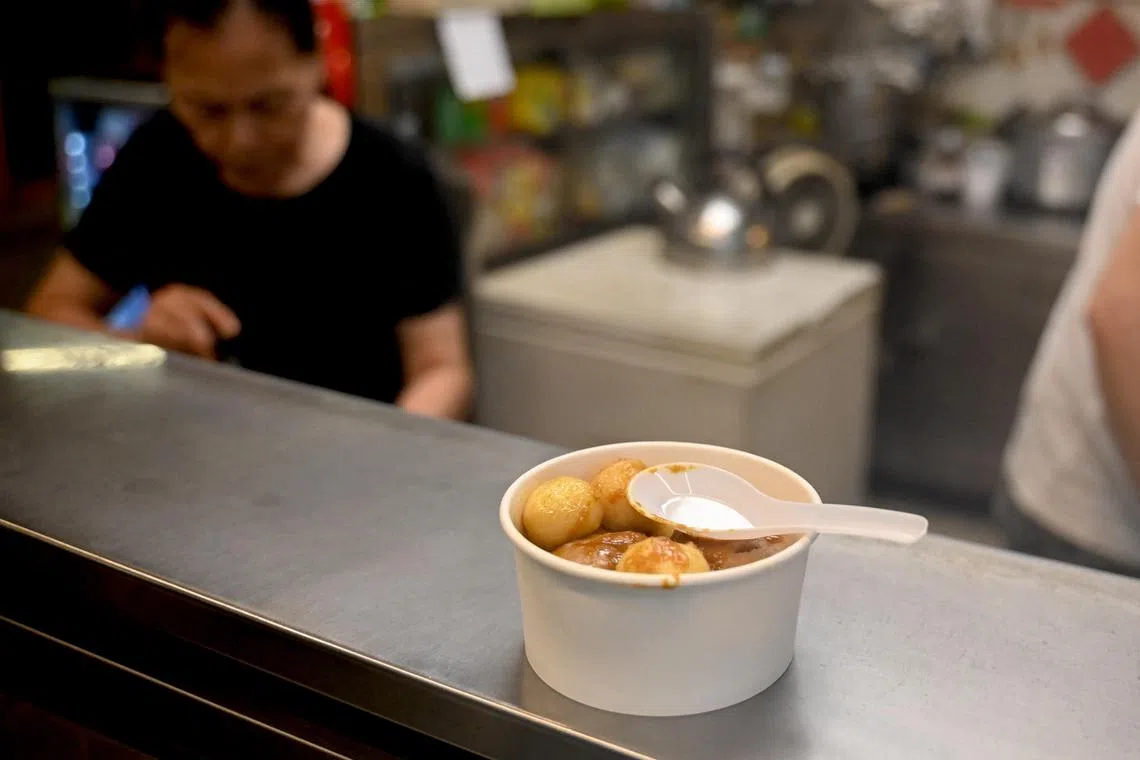Hong Kong sticks a fork in disposable plastic products from Earth Day 2024
Sign up now: Get insights on Asia's fast-moving developments

A bowl of fishballs served with a plastic spoon in Hong Kong. Plastic waste is the city's second-largest source of municipal solid waste.
PHOTO: AFP
Hong Kong – Need a plastic fork at a Hong Kong restaurant? Come Earth Day on April 22, 2024, customers will have to start reaching for more eco-friendly cutlery, according to a Bill passed on Wednesday by the city’s legislature.
Plastic waste is the finance hub’s second-largest source of municipal solid waste, with the average amount disposed of each day totalling 2,331 tonnes in 2021 – a weight equivalent to nearly 70 adult humpback whales.
The city on Wednesday passed amendments to a Product Eco-Responsibility Bill, implementing a blanket ban on the sale and provision of various plastic products – with the first phase taking effect on the next Earth Day in 2024.
That means in 28,000 eateries across the city, “expanded polystyrene tableware and other disposable plastic tableware that are small in size and difficult to recycle” will be prohibited for dine-in and takeaway services, said a government announcement.
Serving soup in plastic containers will also not be permitted, though using them for takeaways will still be allowed – until phase two kicks in.
The government said the start of phase two would “depend on the availability and affordability of the relevant non-plastic or reusable alternatives”.
Freebies in Hong Kong’s hotels and airlines will also look very different – plastic bottles of water or toiletries like plastic-handled toothbrushes, as well as disposable earplugs, will be banned.
Shops selling glow sticks, party hats, cake toppers and cotton buds will also take a hit.
Any violations could result in a fine of between HK$2,000 (S$350) and HK$100,000.
During the legislative session, legislator Peter Koon fretted over the inconvenience eliminating these plastic items would cause, and the extra costs for local residents and tourists.
“I had the experience of buying takeaway hot soup from a shop that had adopted paper containers, but when I got home, the container had broken and the soup had run out,” he said.
“In a society where Chinese cuisine is predominant, I urge the authorities to be more careful, or it may result in the opposite of what we wish.”
The real work of the Bill will begin post-passage, said legislator Michael Tien.
“How to introduce the alternative choices to the public, how to support the industries – this will be a very heavy and important responsibility for the (Environment and Ecology) Bureau.”
Welcoming the news, Greenpeace campaigner Leanne Tam said Hong Kong has been discussing this issue for “about a decade”.
“Hong Kong is now catching up with other cities in the region in terms of reducing plastic waste,” she said. AFP


